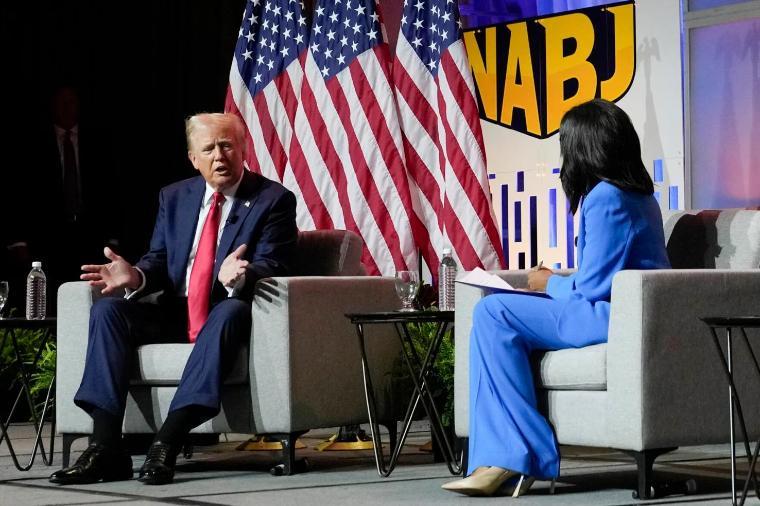This was an important moment, and you rarely get an opportunity like this.
One, Scott herself asked Trump a question using those words, so it’s fair to be asked to define it. Two, “DEI hire” is already used pejoratively akin to “affirmative action hire.” It is used to falsely label people as mediocre, disregarding their journeys. So responding to Trump would have been an effective way to counter the pejorative use, and reclaim the meanings.
Three, this was not a private conversation. Multiple TV networks were livestreaming the event to a nationwide audience. The stakes were high, and clips would be shared. Offering the definitions would have opened up a chance to assert the meanings in public to the man who asked for it. It would have been a public act.
Diversity, equity, and inclusion are separate and significant values in democratic culture, even though our democracy’s institutions often fall short of upholding them. How leaders and managers combine these values to drive policy and resource allocation in institutions is quite complex and varies across organizations and occupations. But that does not take away the need to publicly articulate the conceptual definitions themselves.
One accessible starting point is to use analogs to illustrate the meanings. For instance, leadership advisor Jeff Hutchinson uses this. Diversity is being invited to the party. Equity is having a ramp to the door for the differently abled. Inclusion is being asked to dance. The fuller proposition is laid out here.
Journalists would do well to be a tad nerdier, especially to address follow-up questions they might get. The definitions for DEI at the National Association of Counties (NACO) are more textually detailed and worth sharing with politicians. NACO represents just over 3,000 county governments and 40,000 elected officials in the U.S.
Diversity: The presence of different and multiple characteristics that make up individual and collective identities, including race, gender, age, religion, sexual orientation, ethnicity, national origin, socioeconomic status, language, and physical ability.
Scott’s first and brilliantly worded opening question on Trump’s past in pushing “birtherism” was one to come back to when he asked her to define DEI. After giving him the definition of diversity, Scott could have asked him this: You lied about President Barack Obama’s birthplace to delegitimize him. Are you against the American government’s highest office being led by Black people or women or people of color in general? Are you against diverse leadership for a diverse nation?
Equity: The process of identifying and removing the barriers that create disparities in the access to resources and means, and the achievement of fair treatment and equal opportunities to thrive. (This includes providing more support or resources to those who have been historically disadvantaged or marginalized, to ensure fair treatment, access, opportunity, and advancement.)
As an example for equity, journalists could remind Trump of Congress’ funding of $255 million to HBCUs in 2019, one that he himself signed. This is as clear an example as any for equity as a principle. In fact, at the NABJ event, Trump exaggerated his involvement by claiming he “saved” HBCUs, a claim he has made many times.
Inclusion: Inclusion is creating environments in which any individual or group can be and feel welcomed, respected, supported, and valued to participate fully.
For inclusion, a recent example to offer Trump is Major League Baseball (MLB). It was only in May 2024 that MLB included the records of over 2,300 Negro Baseball League players into it’s official records. Until this, MLB’s statistics were anti-Black. The question for Trump: Do you support MLB’s decision to reverse that systematic exclusion?
One other aspect needs to accompany definitions for DEI. The difference between equity and equality. This difference is less widely understood. Equity is about leveling the playing field before the game begins. Equality can only be implemented on the playing field if everyone interested has had a fair shot at even getting to play itself. Which is why equality comes after equity. That is also why, in DEI, E stands for equity and not equality.
Likewise, without equity, diversity will run hollow very quickly too, because the elite among the marginalized will rise, but the non-elites will not.
Comfort with being questioned about meanings
To be sure, journalists have a reluctance to be counter-questioned by the person they are interviewing because they do not want to become the story. This may be par for the course for interviews with officials on policy making and their decisions. But on issues at the center of the battle over American democracy, asserting meanings to someone who is leading the culture war is significant. It is a way for diverse audiences across the media bubbles to hear the meanings.
So journalists, the next time Donald Trump asks for definitions, take him up on it boldly and stand your ground. If there ever is a next time.
Meanwhile, the best and funny counter-application of the words “DEI hire” came from Lenard Larry McKelvey, known professionally as Charlamagne tha God and co-host of The Breakfast Club podcast. He said that the”DEI hire” in the White House race was Kamala Harris’ need to select a “straight, white male” as her running mate. And Harris did that with Governor Tim Walz this week.
My thanks to Ann Skeet and Joel Dibble for their inputs.
